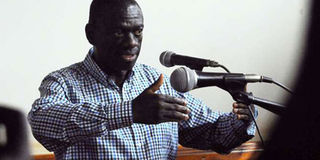Besigye treason trial opens in his absence

Uganda’s Opposition leader Ugandan opposition leader Kizza Besigye speaks in court before his trial for treason in Nakawa in Kampala on May 18, 2016. PHOTO | RONALD KABUUBI | AFP
What you need to know:
- Prosecutor told that suspect could not be brought to court.
KAMPALA, Wednesday
Ugandan opposition leader Kizza Besigye’s treason trial began today with the prosecutor saying he could not be brought to court for security reasons.
Dr Besigye, who claimed fraud after coming second in February’s presidential election, was arrested last month for holding a mock swearing-in ceremony and charged with treason.
He is being held at the maximum security Luzira Prison in the capital Kampala.
State prosecutor Lino Angunzu told the judge that Besigye could not be brought to court because of “a specific security threat” and requested that further hearings be held inside the prison.
Chief Magistrate James Ereemye Mawanda said he would rule on the request on June 15 and adjourned the case until then.
Opposition party officials and supporters who had thronged the small courtroom jeered as the brief hearing took place.
Mugisha Muntu, president of Besigye’s Forum for Democratic Change party, said the proceedings were “absurd” and a “manipulation of the judicial system by the executive".
Besigye was arrested in Kampala on May 11 after staging his mock inauguration ahead of President Yoweri Museveni’s swearing-in.
He was then whisked to a northern town and charged with treason before being brought back to the capital a few days later.
Treason is a capital offence in Uganda, but the death penalty has not been carried out for years.
Besigye was earlier charged with treason in 2005 and the case was eventually dropped.
A long-standing opponent of Museveni, Besigye has been frequently jailed, placed under house arrest, accused of both treason and rape, tear-gassed, beaten and hospitalised over the years.
Museveni seized power at the head of a rebel army in 1986 and has ruled the country ever since. His victory in February’s poll marked the start of his fifth term in office and fourth decade in power.
The opposition refuted this year’s poll results and went to the Supreme Court but the Court said that although there were anomalies, the pitfalls did not substantially affect the result of the election.
Police have foiled opposition protests arguing that they are intended to cause chaos in the country.






